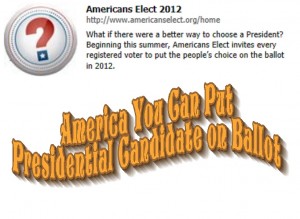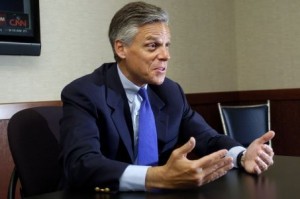 This late summer should have been prime time for a centrist third party movement called Americans Elect. With Barack Obama’s approval ratings around 40 percent, and a profound fear that Republicans are too extreme and too un-serious to govern, the case for another political path is arguably being made by events.
This late summer should have been prime time for a centrist third party movement called Americans Elect. With Barack Obama’s approval ratings around 40 percent, and a profound fear that Republicans are too extreme and too un-serious to govern, the case for another political path is arguably being made by events.
But unless you are an avid reader of Tom Friedman’s columns at the New York Times, or Matt Miller at the Washington Post, you’ve likely never heard of Americans Elect and their audacious plan to qualify for the 2012 ballot in all 50 states. They are well-heeled, based on starting capital from some major hedge-fund players; respectable enough to have caught the attention of serious people like Friedman and Miller; and essentially still an anonymous blip on the public radar.
 A major part of the skepticism is historical in nature – the last credible third party, the Progressives in 1912, had the virtue of being led by a popular ex president, and the updated versions have been regional demagogues or self-appointed provocateurs. Then there is the Nader factor – the experience that a third party often guarantees that the “evil”, rather than the “lesser of two evils”, wins.
A major part of the skepticism is historical in nature – the last credible third party, the Progressives in 1912, had the virtue of being led by a popular ex president, and the updated versions have been regional demagogues or self-appointed provocateurs. Then there is the Nader factor – the experience that a third party often guarantees that the “evil”, rather than the “lesser of two evils”, wins.
All true. Yet, the national atmosphere lately has been unsettled enough that the past has ceased being the predictor of the future in politics. The grip of Democrats and Republicans on voter loyalty is weaker than it has traditionally been. We are also on the cusp of a double dip recession handmade by dysfunctional two-party politics.
Americans Elect won’t win and don’t yet deserve to. The two Americans who could credibly win the presidency on a centrist independent ticket, Hillary Clinton and David Petraeus, chose to stay on the inside. But it would help break our polarized status-quo if Americans Elect gets its sea-legs. Here are a few ideas for how it might happen.
First, the group will need to abandon its well-intended premise that leadership rises from the bottom. Its process for selecting a ticket – an online virtual convention in the summer of next year – seems too prone to be hijacked by, say, Donald Trump or Ron Paul; it is also too distant and too unstructured to produce the machinery and organizational apparatus that is still necessary to mobilize Americans to engage politics.
To be viable, even within its own terms of influence rather than victory, Americans Elect will have to do the hard work of cultivating a core of public figures who are willing to build an economic, pro-growth platform that is un-tethered to the orthodoxies of the Left or the Right. That means a center ground that among other things, is unafraid to reform immigration policy; will realign entitlements in a way that doesn’t gut middle-income seniors; will radically alter the way we teach our children and recruit our teachers; and is adept enough to trim the corporate privileges and the anti-competitive deadweight out of the tax code at the same time.
 And lastly, Americans Elect needs to have a real conversation with Jon Huntsman. He is not going to win the Republican nomination. Even worse, he is not going to lose in a way that makes a difference. Arguably, Huntsman is the one presidential level figure who is speaking the language of a third way in our politics, but he is trapped in the interest group banalities of party primaries. A union between Jon Huntsman and Americans Elect might keep both of them out of the trivia books.
And lastly, Americans Elect needs to have a real conversation with Jon Huntsman. He is not going to win the Republican nomination. Even worse, he is not going to lose in a way that makes a difference. Arguably, Huntsman is the one presidential level figure who is speaking the language of a third way in our politics, but he is trapped in the interest group banalities of party primaries. A union between Jon Huntsman and Americans Elect might keep both of them out of the trivia books.
(Cross-posted, with permission of the author, from Politico’s Arena)









Leave a Reply